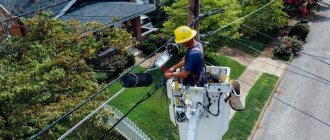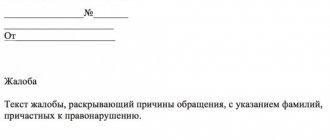Home / Complaints, courts, consumer rights / Services and consumer protection
Back
Published: September 24, 2018
Reading time: 7 min
2
899
The work of energy supply companies and the conditions for limiting the supply of electricity to the population are regulated by Decree of the Government of the Russian Federation dated May 4, 2012 N442 “On the functioning of retail electricity markets, complete and (or) partial limitation of the mode of consumption of electrical energy.” The resolution defines a number of cases when the supplier has the right to turn off the lights:
- Failure to fulfill payment obligations in an amount exceeding three monthly payments.
- Illegal connection to network power supplies.
- Other violations of the agreement concluded between the consumer and the supplier.
- Carrying out repair work.
- Elimination of an emergency situation.
- Submitting an application from the consumer to limit the energy supply.
Electricity suppliers are required to warn citizens about the timing and reasons for shutdowns no later than 10 days before the events.
Limitation of electricity supply for residents of apartment buildings and the private sector should not exceed more than a day and be more than 72 hours per year.
- Illegal grounds for disconnection
- Where to complain about a power outage Resource supply organization
- Prosecutor's office
- Rospotrebnadzor
- Local authorities
- Court
- Recording a violation
For enterprises and organizations, the standards are specified in the contract with the service provider.
Illegal grounds for disconnection
In addition to scheduled inspections, there are situations when the lack of electricity violates the rights of citizens and requires contacting various authorities designed to resolve the conflict:
- There is no light for more than 24 hours even if a scheduled check is carried out.
- The supplier limited the supply without specifying the reason.
- The limit exceeds 72 hours per year.
- Disconnection for non-payment of less than three months' payment for electricity.
- Disconnection for non-payment without prior warning to the debtor by an official letter with the latter’s confirming signature.
Time frame for elimination
Consumers must be provided with an uninterrupted supply of electricity throughout the year. In accordance with clause 9 of Appendix No. 1 of Resolution No. 354, a break in the electricity supply is allowed for two hours if there are two independent mutually redundant power sources. The permissible duration of a power outage can be 24 hours with one power source.
An interruption in the supply of electricity is not allowed if this could lead to a shutdown of networks and equipment that belongs to the common property of an apartment building, ensuring the uninterrupted operation of in-house engineering systems and safe living conditions for citizens.
These deadlines apply to cases of planned repair work on power lines. They are prescribed in the agreement between the consumer and the utility service provider. Energy supply companies inform you in advance about the start of planned work (read more about the procedure for turning off electricity here, and you can find out more about the planned interruption of electricity supply here).
Regarding emergency situations requiring an unscheduled power outage, the legislation does not establish specific deadlines for repair work. In each specific case, the time frame for restoring power supply may vary. This depends on the complexity of the breakdown and the amount of resources to fix it. In the event of natural disasters (flood, hurricane, etc.), natural conditions also affect the period.
Electricity is one of the main household goods of modern society, and turning it off brings a lot of problems for residents. There may be several reasons for the shutdown, one of which is late payment for supplied energy resources. From our materials you will learn how to turn off the power for non-payment, the owner to refuse electricity supply, and also whether the chairman of SNT or the management company has the right to stop the supply of electricity - read in our materials.
Where to complain about a power outage
In cases of permanent power outages without warning, citizens have the right to file a complaint against the organization supplying electricity to the following authorities.
Resource supplying organization
The first step in resolving a power outage problem is to contact your service provider in writing.
If there has been a massive power outage, it is best to file a complaint for illegal shutdown as a group. The application should be prepared in two copies, one of which must be left in hand with a note of receipt. Those who apply will be notified in writing about the results.
If the problem remains after contacting, you should complain to higher authorities.
Prosecutor's office
A complaint to the prosecutor's office can be filed if the supplier's actions were illegal and citizens have a sufficient evidence base: calling the employees of the energy supply organization, calling the management company, the emergency service, a statement to the supplier, etc.
Rospotrebnadzor
There are several ways to file a complaint with Rospotrebnadzor:
- when applying in person at your place of residence. The application is drawn up in any form, with a detailed description of the situation. The preferred option is a collective complaint, they are considered first and have a greater resonance;
- by mail to the address of the authority;
- by submitting an electronic application on the official website of Rospotrebnadzor . You can attach evidence to your appeal in the form of photographs and videos, scanned documents, etc.
Local authorities
A complaint about permanent blackouts can be submitted to the local administration. Within up to 30 days, specialists are required to provide a written response to the request, explaining the reasons.
Court
If there is a constant blackout and inaction on this issue by the resource supplying organization and administration, you can file a claim with the judicial authorities at your place of residence. All available evidence in the case must be attached to the application.
Who to file a claim with
A written expression of dissatisfaction with the quality of supplied electricity or illegal actions to disconnect from the power grid can be sent to:
- to the energy supply organization itself;
- to the local executive authority;
- to the Federal Antimonopoly Service;
- to the prosecutor's office;
- to Rospotrebnadzor.
In addition, you can draw up a statement of claim and send it to the court.
In this case, only a complaint to the energy supply organization will have the nature of a claim. And only she can make demands on:
- recalculation due to low quality of supplied energy;
- compensation for damage, including moral damage, caused by inadequate quality of electricity or disconnection from the power grid.
Appeals to all other above-mentioned bodies will have the nature of a complaint or statement, even if the text is identical.
If you write a complaint to Rospotrebnadzor, then the request will be for the obligation of the energy supply organization to perform certain actions.
The fact is that neither Rospotrebnadzor, nor the prosecutor’s office, nor the municipality can recover anything from the electricity supplier. They can only punish him.
So, if, among other things, you want, for example, compensation for damage, then the claim must be sent directly to the supplier. And if you do not want to waste time on claims, then you can go straight to court.
So, let's summarize. Regardless of who turned off your electricity or who is to blame for the power outages:
- the claim is written with Energosbyt;
- the complaint is written to Rospotrebnadzor, the Criminal Code, HOA, SNT, the federal antimonopoly service or the prosecutor's office;
- the claim is filed in court.
You determine the addressee and type of appeal independently and at your own discretion.
How to write a complaint correctly
When drawing up an application to the prosecutor's office, court or Rospotrebnadzor, you must adhere to several rules:
- In the header of the application, indicate the name of the organization where the application is being written , as well as the full name of the head and personal information of the applicant with contacts. Anonymous appeals will not be considered by any authority in accordance with the Federal Law “On the procedure for considering appeals from citizens of the Russian Federation” dated May 2, 2006 N59-FZ.
- The main part of the document should describe the problem in detail , indicating the reasons for the appeal.
- Requirements should be stated at the end of the document.
- Below indicate the date and signature of all applicants (in the case of a collective complaint).
- Attach evidence.
A sample complaint about a power outage to the prosecutor's office, court or Rospotrebnadzor can be viewed at the link.
Recording a violation
In order to prove a permanent blackout, you can use witness testimony or note the fact of restrictions by calling emergency or resource service employees, who are required to draw up a report on the illegal blackout. It is this document that can be used as the main evidence in the future.
What documents should be attached to the complaint?
When filing an application, the availability of evidence is decisive for deciding whether the restriction of light supply is illegal.
The following should be attached to the document:
- witness's testimonies;
- receipts confirming the absence of debt;
- act confirming the blackout , drawn up by specialists of the emergency service or organization supplying electricity;
- statement and responses from the service provider , management company or local administration;
- other documents confirming the fact of illegal disconnection.
Features of gardening non-profit partnerships
SNT members receive electricity through an intermediary, that is, through the SNT administration, which has entered into an agreement with the energy supply organization. In this case, payment is made not by calculating the energy consumed, but through membership fees, which include the price of consumed electricity within the entire partnership.
The SNT administration, by transferring part of the membership fees, settles with Energosbyt for:
- electricity consumption by each section (individual consumption;
- electricity consumption in the interests of the entire SNT (public consumption).
Accordingly, arrears in membership fees lead to the formation of SNT arrears in payments for electricity. Because of this, if there is a debt, the SNT administration (general meeting) has the right to disconnect individual consumers from the internal power grid.









